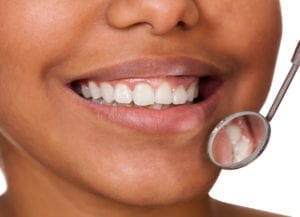 Our teeth are so important to everyday life. We eat with them which nourishes our bodies so we can grow strong and stay healthy. We also use them to smile which is a big part of making a good first impression whenever we meet new people. Humans grow two sets of teeth in their lifetimes: primary or baby teeth and secondary or adult teeth.
Our teeth are so important to everyday life. We eat with them which nourishes our bodies so we can grow strong and stay healthy. We also use them to smile which is a big part of making a good first impression whenever we meet new people. Humans grow two sets of teeth in their lifetimes: primary or baby teeth and secondary or adult teeth.
Once you have all of your adult teeth, usually by the time you are twelve or thirteen years old, it is paramount that you care properly for them as you will not be getting anymore naturally (with the exception of wisdom teeth). The most common threat to a long life for your teeth are cavities.
What Is A Cavity?
Cavities are the dental term for spots of tooth decay that develop on our teeth where tooth enamel has weakened and broken open. This exposes the sensitive soft tissues and nerves within to bacteria which can cause infections. Cavities can create sensitivity to temperature and touch and can even make chewing properly difficult. This can hinder your ability to eat a varied diet and can cause you not to get all the nutrients you need.
Cavities are the most frequently diagnosed ailment that humans are afflicted with after the common cold. But what causes this threat to our teeth? How can we do to fix them? And most importantly, how can we prevent them so we don’t have to fix them? Nesconset Dental Associates in Nesconset, NY has the answers.
How Do Cavities Form?
Our mouths are an ideal environment for live bacteria — most of which are relatively harmless — to thrive. These bacteria tend to concentrate and feed on plaque (a combination of saliva and leftover food particles) in places that are hard for us to clean such as in between teeth and right at or just below the gum line. When we eat foods that are rich in carbohydrates such as sugars (like donuts and candy) or starches (like potato chips), the bacteria in our mouths break these components down. This process creates acids that feast on the plaque on or between our teeth and just keep going through our enamel.
How Are Cavities Treated?
Cavities are usually treated by your dentist by being filled in and reinforced with various substances. This stop the process of decay by denying any further bacteria and acids access to the weak part of the tooth. Materials used for fillings can be composite resin, amalgamated metals, gold, silver or glass ionomer. Your Nesconset Associates dentist or your area dentist will discuss the options with you and help you decide which route would work best for your teeth.
Preventing Cavities
It is easier to prevent cavities than it is to repair them once you have them. The American Dental Association recommends brushing after every meal or at least twice daily with a fluoride-infused toothpaste to remove the plaque that leads to cavities. Dentists also recommend cutting down on your intake of carbohydrates and increasing the amount of water you drink as a dry mouth can speed up the acidic breakdown of your teeth. Flossing daily clears away the plaque between teeth and prevent the formation of cavities in those hard to reach places.
However, scheduling regular check-ups and cleanings at your dentist’s office is the most important part of preventing cavities. For those patients in Nesconset, NY area, call (631) 228-8780 or schedule an appointment online to consult with your Nesconset Associates dentist. If you think you may be suffering from cavity or would just like a cleaning to prevent them, contact us today!
